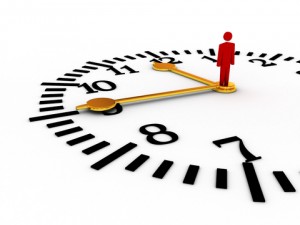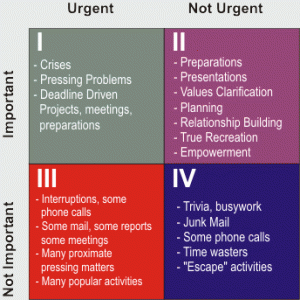Rose O. Sherman, EdD, RN, FAAN
“All of us spend time doing ridiculous things that are a complete waste of time simply to avoid going out of our comfort zone” – Dr. Stephen Covey
 Many of you may have more effective time management on your goals list for 2012. It is unsatisfying to work extremely hard during your shift yet come home feeling both exhausted and guilty about what was left undone. Managing your time well is a critical leadership skill. While the unexpected is a routine part of the health care environment, there are some effective tools that can help you on your journey to becoming more productive in how you use your time.
Many of you may have more effective time management on your goals list for 2012. It is unsatisfying to work extremely hard during your shift yet come home feeling both exhausted and guilty about what was left undone. Managing your time well is a critical leadership skill. While the unexpected is a routine part of the health care environment, there are some effective tools that can help you on your journey to becoming more productive in how you use your time.
What is really Urgent?
Understanding what is really urgent in your work requires careful consideration and it will be different in different roles. Stephen Covey in his Seven Habits of Highly Effective People presented a model with four quadrants. The goal here is to put first things first by identifying different levels of urgency. – even if the activity is something unpleasant. All of our time can be divided into one of these four quadrants. The matrix below is an example of the model with typical leadership activities/responsibilities placed in each of the four quadrants. Categorizing our work requires honesty. We may enjoy socializing or talking with professional colleagues but is it really category 2 or do we engage in so much of it that it is category 4.
Using To-Do Lists
Using to-do lists can be quite helpful in making sure that goals get accomplished. The challenge with these lists is that sometimes they become so long that the lists themselves seem overwhelming. Leo Babauta, author of the blog Zen Habits, provides some good advice about this. He suggests that we establish no more than 4 goals to achieve for the week – which he describes as Big Rocks. Each day of the week we should establish what our 1-3 most important tasks are and then be sure to complete those. Babauta also advises that it is easier to complete tasks if we can focus on one task at a time and learn to say NO to commitments that are not essential, don’t contribute to your goals or add value to your life.
Avoiding Interruptions
Interruptions to our work flow are routine especially in health care settings but are they really acceptable? Increasingly in clinical practice, it is recognized that they can present risks to patient safety.
Hall, Pedersen and Fairley in recent research conducted in Canadian hospitals found that workplace interruptions are a significant issue on nursing units. Interestingly, the majority of the interruptions came from unexpected interactions with other health care team members most often communication related to patient care issues. Most of the interruptions observed could have had a negative effect on patient safety versus improving patients care.
Researchers have found that it can take between 10 and 20 minutes to get back on track after an interruption so they also need to be viewed as significant time wasters. In clinical environments, we have seen the introduction of interruption-free zones in medication rooms.
Some good tips to avoid interruptions and reduce distractions in your environment include the following:
- Develop an awareness of the negative issues with interruptions.
- Abstain from being the cause of an interruption….ask Is this a good time for You?
- If you need a distraction free zone – close the door and put a sign on it.
- If you have only five minutes to talk – say that up front so the conversation can be focused.
- If you need to finish a task you have started, say so let the person know when you will be free.
- Let your phone go to voice mail, turn off your email, text messages or other communication devices when you are trying to focus.
Read to Lead
Covey, S. (2004). Seven Habits of Highly Effective People. Free Press
Hall, L.M., Pedersen, C. & Fairley, L. (2010). Losing the Moment: Understanding Interruptions to Nurses’ Work. Journal of Nursing Administration, 40(4). 169-176.
© emergingrnleader.com 2012



 LinkedIn
LinkedIn Instagram
Instagram